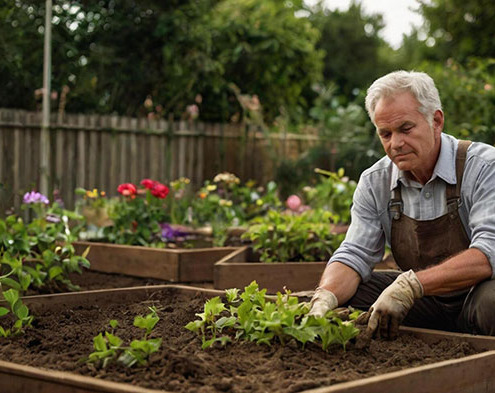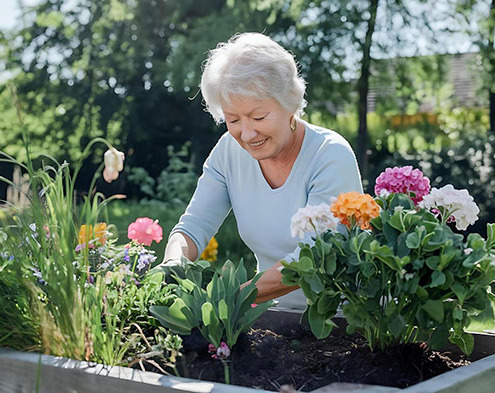Blooming at Any Age: The Joy and Benefits of Gardening for Seniors
 Gardening is one of those rare hobbies that combines physical movement, mental engagement, and emotional peace in a way that feels natural and rewarding. It’s not just an activity; it’s a gentle form of exercise that keeps the body in motion without overexertion.
Gardening is one of those rare hobbies that combines physical movement, mental engagement, and emotional peace in a way that feels natural and rewarding. It’s not just an activity; it’s a gentle form of exercise that keeps the body in motion without overexertion.
For seniors, the beauty of gardening lies in its adaptability. You can pace yourself and customize your garden to suit your needs, making it a welcoming space regardless of age or fitness level. Plus, the sense of achievement that comes with planting a seed and watching it grow into a thriving plant is unparalleled.
Whether you’re new to the hobby or rediscovering it after years, this article will explore why gardening is such a wonderful activity for older adults and how it can positively impact every aspect of life.
Jump to article sections:
- How Gardening Promotes Physical Health in Seniors
- Mental Health Benefits of Gardening for Seniors
- Social Connections Through Gardening
- Gardening Tips for Seniors with Limited Mobility
- Gardening as a Legacy to Share with Loved Ones
- How to Create a Safe and Accessible Garden
- Bring the Garden Inside in Senior Living Apartments
- The Joy of Garden Visits in Senior Living Communities
1. How Gardening Promotes Physical Health in Seniors
Tending to a garden may not seem like a workout, but it’s a fantastic way to boost physical health. The movements involved in planting, weeding, pruning, and watering engage your muscles, promote flexibility, and encourage light cardio activity, all without putting undue stress on the body. For seniors, this can translate to improved mobility, better coordination, and enhanced overall strength.
Spending time outdoors while gardening also helps soak up vitamin D from sunlight, which is essential for bone health and immunity. Additionally, activities like digging or turning the soil can improve endurance and keep your joints active. Even something as simple as walking around your garden daily can contribute to long-term physical wellness.
2. Mental Health Benefits of Gardening for Seniors
Gardening isn’t just good for the body; it’s balm for the soul. Studies have shown that spending time in green spaces helps reduce stress, anxiety, and feelings of depression. For seniors, this sense of calm can be incredibly valuable, especially when facing life transitions or feelings of loneliness. Seniors mental health is a growing concern, and gardening offers a natural way to boost mood and improve overall well-being.
The repetitive actions of gardening, like digging or pruning, can be meditative in nature, promoting mindfulness and mental clarity. Meanwhile, the scents, colors, and textures in a garden provide sensory stimulation that can boost cognitive health. For individuals with memory challenges or early-stage dementia, gardening provides a gentle way to stay mentally active and engaged with their surroundings.
3. Social Connections Through Gardening
Gardening can be as solitary or as social as you’d like. For seniors looking to connect with others, it opens up wonderful opportunities to engage with the community. Joining a community garden, enrolling in a gardening club, or simply sharing your plants and gardening tips with neighbors can help you build meaningful relationships.
Group gardening activities are especially great for socializing. They encourage teamwork, foster friendships, and create a sense of belonging.
4. Gardening Tips for Seniors with Limited Mobility
Gardening is a hobby that adapts to you. For seniors with mobility limitations, simple adjustments can make all the difference in creating a safe and enjoyable gardening experience. Raised garden beds are a fantastic option, as they allow you to tend to plants without constant bending or kneeling.
Adaptive tools, such as ergonomic handles or long-reach pruners, can also reduce strain on joints. Adding a sturdy chair or kneeling pad in your garden can make planting and weeding more comfortable. Choose low-maintenance plants like succulents, marigolds, or hostas that don’t require constant attention. These small adjustments can make gardening fun and stress-free for everyone.
5. Gardening as a Legacy to Share with Loved Ones
Gardening offers an incredible opportunity to create lasting memories with loved ones. Sharing your gardening passion with younger family members, like grandchildren, gives them a chance to learn life skills and cultivate patience and responsibility. Whether you’re teaching them how to plant seeds or how to care for sunflowers, these moments can leave a lasting impression.
6. How to Create a Safe and Accessible Garden
It’s important to ensure your garden is both safe and welcoming, especially as you age. Start by designing a space with accessibility in mind. Non-slip pathways, comfortable seating, and shaded areas for breaks can make your garden more user-friendly. Vertical gardens and trellises can save space and reduce the need for bending.
Choose plants that are easy to maintain yet thrive in your climate. Hardy and pest-resistant plants, like lavender or zinnias, can keep your workload light. Consider automating some tasks with drip irrigation systems or self-watering pots. These thoughtful choices can help you enjoy a thriving, lush garden with minimal effort and maximum safety.
7. Bring the Garden Inside in Senior Living Apartments
 Gardening is not just for those with large yards and ample outdoor space. It can also be a rewarding activity for seniors living in apartments or other small living spaces. For those living in a smaller space, opt for herb or vegetable gardens that can easily fit on a windowsill. This not only brings the beauty of nature indoors, but it can help make a new senior living space feel like home.
Gardening is not just for those with large yards and ample outdoor space. It can also be a rewarding activity for seniors living in apartments or other small living spaces. For those living in a smaller space, opt for herb or vegetable gardens that can easily fit on a windowsill. This not only brings the beauty of nature indoors, but it can help make a new senior living space feel like home.
Consider using vertical space to create a hanging garden with potted plants or succulents. These types of gardens require minimal maintenance and can add a pop of color and life to any room. Indoor gardening can also be therapeutic and provide mental stimulation for seniors, making it a valuable activity for overall well-being.
8. The Joy of Garden Visits in Senior Living Communities
Another way for seniors to experience the joys of gardening is by visiting public gardens or parks. Many cities and towns have botanical gardens, community gardens, or even green spaces that welcome visitors of all ages.
These outings can be an excellent opportunity for seniors to get some fresh air, exercise, and socialize with others while taking in the beauty of different plants and flowers. You can also look for a senior living home with gardens onsite to explore. Plus, many senior homes will visit gardens for fun day trips especially in the spring.
For senior living apartments in Wauwatosa, Wisconsin with beautiful grounds consider Harwood Place. Harwood Place is located on 15 acres of wooded grounds and offers a variety of outdoor spaces for seniors to enjoy. From walking paths and gardens to an outdoor gazebo and individual garden plots, residents can take in the sights and sounds of nature while staying active. See beautiful senior apartments in Wauwatosa for yourself and visit Harwood Place today!




 Dr. Champalal Gupta, MD
Dr. Champalal Gupta, MD



